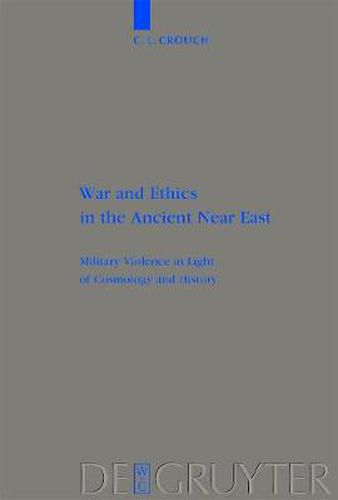Readings Newsletter
Become a Readings Member to make your shopping experience even easier.
Sign in or sign up for free!
You’re not far away from qualifying for FREE standard shipping within Australia
You’ve qualified for FREE standard shipping within Australia
The cart is loading…






The monograph considers the relationships of ethical systems in the ancient Near East through a study of warfare in Judah, Israel and Assyria in the eighth and seventh centuries BCE. It argues that a common cosmological and ideological outlook generated similarities in ethical thinking.
In all three societies, the mythological traditions surrounding creation reflect a strong connection between war, kingship and the establishment of order. Human kings’ military activities are legitimated through their identification with this cosmic struggle against chaos, begun by the divine king at creation. Military violence is thereby cast not only as morally tolerable but as morally imperative.
Deviations from this point of view reflect two phenomena: the preservation of variable social perspectives and the impact of historical changes on ethical thinking. The research begins the discussion of ancient Near Eastern ethics outside of Israel and Judah and fills a scholarly void by placing Israelite and Judahite ethics within this context, as well as contributing methodologically to future research in historical and comparative ethics.
$9.00 standard shipping within Australia
FREE standard shipping within Australia for orders over $100.00
Express & International shipping calculated at checkout
Stock availability can be subject to change without notice. We recommend calling the shop or contacting our online team to check availability of low stock items. Please see our Shopping Online page for more details.
The monograph considers the relationships of ethical systems in the ancient Near East through a study of warfare in Judah, Israel and Assyria in the eighth and seventh centuries BCE. It argues that a common cosmological and ideological outlook generated similarities in ethical thinking.
In all three societies, the mythological traditions surrounding creation reflect a strong connection between war, kingship and the establishment of order. Human kings’ military activities are legitimated through their identification with this cosmic struggle against chaos, begun by the divine king at creation. Military violence is thereby cast not only as morally tolerable but as morally imperative.
Deviations from this point of view reflect two phenomena: the preservation of variable social perspectives and the impact of historical changes on ethical thinking. The research begins the discussion of ancient Near Eastern ethics outside of Israel and Judah and fills a scholarly void by placing Israelite and Judahite ethics within this context, as well as contributing methodologically to future research in historical and comparative ethics.